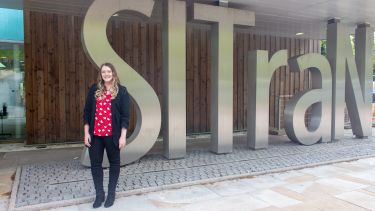The masters course is what spurred my interest in pursuing a career as a researcher

Is there a reason you chose to study Clinical Neurology at Sheffield?
“It was a fellow BSc Psychology student who first mentioned the MSc Clinical Neurology course to me. Looking into it, I thought it would be perfect for enhancing my understanding of neuroanatomy and neurological diseases - something they touched on at undergraduate level. I was also keen to engage with people living with health conditions, and to develop and enhance my research skills.
“The Sheffield institute for Translational Neuroscience (SITraN) is known for world-leading research and I knew it would be the best place for me to gain new skills and learn from experts in the field of neurology.”
What did you enjoy most about the Clinical Neurology masters?
“I particularly enjoyed being able to shadow consultants in specialist clinics. It allowed me to gain an insight into how healthcare professionals interact with people living with health conditions, and see how the knowledge gained on my course applied to the clinic.
“I also thoroughly enjoyed the laboratory dissection sessions where we were able to explore the anatomy of the human brain and spinal cord. There was something incredibly moving about holding a brain in your hands. It left me speechless. I was fascinated by the fact I was holding someone’s entire existence in my hands and it really helped me to gain a thorough understanding of neuroanatomy.”
Tell us about the research project you carried out during the course?
“During my MSc, I carried out a project to explore people’s experiences of public involvement in motor neuron disease (MND) research. I interviewed members of the Sheffield Motor Neurone Disorders Research Advisory Group (SMNDRAG) about their experiences. This included people living with MND, their family members, charity representatives and SITraN employees. I also interviewed researchers and clinicians who had worked with the group.
I could not have asked for a better supervisor. Dr Esther Hobson, supported me throughout the whole project and helped me develop the necessary skills to run a successful project which received positive feedback from clinicians and SMNDRAG.
Not only was I the first author on the published peer-reviewed paper of the study, but I was incredibly proud to be awarded the Irene and Richard Beard Prize in Clinical Neurology for the highest overall masters’ result. Never in a million years did I think I would achieve this. To anyone concerned that Clinical Neurology will be too ‘medical’ for them, trust me if I can succeed then anyone can!
Lucy Musson
In what ways has the masters course informed your current path?
“The masters course is what spurred my interest in pursuing a career as a researcher. I gained a grounding in neurological diseases and a passion for wanting to work in MND research. I also developed an understanding about Good Clinical Practice as well as a variety of research and technical skills.
“My dream since graduation has always been to complete a PhD. I initially worked as a researcher within SITraN, before being lucky enough to receive a studentship to do my PhD at SITraN, which I started in March 2023. My work is supervised by Dr Esther Hobson and Professor Chris McDermott and will look at how we can harness the potential of existing technologies to monitor respiratory function in MND to improve the care and outcomes for people living with the condition.
“I am keen to enhance my skills in order to become an effective, independent and well-rounded researcher capable of managing my own projects in the future. I am dedicated to having a long-term career as a researcher and continue to work on projects that have the potential to improve the lives of people living with MND.”

Masters study discovery afternoon
See where a Sheffield masters could take you with our on-campus event. Get expert advice, take a campus tour and chat to current students.

